- Home
- Keith R. A. DeCandido
Worlds of Star Trek Deep Space Nine® Volume Three Page 21
Worlds of Star Trek Deep Space Nine® Volume Three Read online
Page 21
Whatever the case, it mattered little to her. A Founder was still a Founder, and the Founders were gods. They spoke only rarely to her—to any Vorta or Jem’Hadar or other humanoid, as far as she knew—so when they did, she listened. She knew that she served the Founders well, but she strived to serve them better than any other Vorta did, than any other Vorta ever had.
After securing the transporter console, Vannis turned fully toward the Founder. The shining mass stirred here and there, pushing outward, pulling inward, rising and falling, almost as though breathing. The urge to ask how she could serve the Founder nearly overwhelmed her, but she fought down the impulse. Too often she had witnessed the sycophancy of her people—had even practiced it herself—only to see a Founder respond with loathing and contempt. Over time, she had come to understand such reactions to be a by-product of Vorta behavior and demeanor, and not simply of the Vorta themselves. Since that realization, Vannis had labored to modify her own conduct in order to avoid incurring the disdain of her gods.
And so now she waited.
Before long, the Founder shifted, a small portion of it drawing upward near its center. Its flesh then moved again there, and developed into the shape of a mouth—not into eyes or a nose or any other facial characteristics, but only into a mouth, which immediately spoke. “What is the situation with the Overne?” the Founder asked, its voice high enough to be categorized as traditionally female.
Vannis stepped over to the center of the threshold dividing the transporter alcove from the rest of the bridge. “The agricultural plague on Overne III has been eradicated,” she reported. “But foodstuffs are low and, even rationed, might not last through the winter in the northern hemisphere.” The Overne served an important role within the Dominion, manufacturing both ships and weapons for the Jem’Hadar. They operated facilities in several systems, but their primary drive production and starship assembly took place in plants on and around their home planet. Recently, a mutant virus had destroyed crops worldwide there, threatening the population with famine.
“The foodstuffs might not last the winter?” the Founder said, her tone impatient. “When will you know with certainty?”
“Within the next two to three weeks,” Vannis said. Then she realized that in answering the Founder’s question directly, she had failed to provide other important and relevant information. She quickly added, “But we have a solution ready.”
“And what is that solution?” the Founder demanded. Although Vannis had seen the effect before, the faceless mouth unnerved her a bit as it formed words.
“We have brought another world, Rindamil III, into the Dominion,” she answered. The planet had been located just beyond the perimeter of Dominion space, and now marked its outer boundary. The Rindamil themselves lacked warp capabilities—although they did possess rudimentary transporter technology—and had not yet ventured past their moon, but she had personally introduced them to life beyond their world. “If necessary,” Vannis further explained, “this new Dominion planet will provide food for the Overne.”
“Why are you waiting to see if it will be necessary?” the Founder asked.
“Because the Rindamil foodstuffs cannot fully support the populations of both worlds,” Vannis said.
“They don’t have to,” the Founder asserted. “They only have to support the Overne. The starships and weaponry needed to protect the Dominion are the priority.”
“I understand,” Vannis said. “Shall I commence transfer of the foodstuffs at once?”
To her surprise, the Founder did not reply right away, and Vannis had to suppress a compulsion to fill the hush that followed with her own voice and words. She wanted to make sure that she had not angered the changeling, or failed her in some way. But she knew that seeking such assurances would only serve to infuriate the Founder.
And so again she waited.
At last, the Founder said, “You will wait two weeks only to assess the severity of the Overne winter and its impact on the food supply. If there is any possibility of a shortfall, begin shipments from Rindamil III at once.”
“Acknowledged,” Vannis said. She peered over at the transporter console and took note of the time. She would follow the orders precisely.
“Before then,” the Founder continued, “I want you to take a ship to a moon orbiting a world near the Anomaly.” She listed the Dominion designation and coordinates of the planet, which Vannis also committed to memory. “A tribe called the Sen Ennis resides there. A Founder was told by a former inhabitant of the moon that a member of a race calling themselves the Ascendants spent some time there when its ship crashed, although it has since departed.” Vannis assumed the Founder referred to Odo, whose recent travels she had learned about from Weyoun. “I want you to go there and determine whatever details you can about the incident, about the Ascendants themselves, about their return to this region of space, about their technology…whatever you can learn.”
“Acknowledged,” Vannis said again.
“Do you have anything to report?” the Founder then asked.
A number of items passed through Vannis’s mind—the new trade agreement with the Alorex, the construction of the education center on Karemma, the resumption of subspace-relay operations on Callinon VII—but she knew that since none of those issues bore directly on the security of the Great Link, the Founder would have no interest in any of them. “No,” she said. “I have nothing else to report.”
“Then send me home,” the Founder said. After the last word, the lips that formed her mouth sealed and blended back into her changeling body.
Vannis quickly returned to her position before the transporter console, specified the appropriate settings, and beamed the Founder back to the planet below, to one of the numerous small islands scattered throughout the extent of the Great Link. Then she turned to the rest of the bridge, quickly scanning the Jem’Hadar that worked at various stations and picking out the ranking soldier. “First,” she said, and when he looked over at her, “prepare to break orbit.” She enumerated the details of their destination, as provided by the Founder. “Best possible speed.”
The Jem’Hadar first acknowledged the order and set his crew to work. As the impulse drive came alive and sent a familiar vibration through the bridge, Vannis crossed to a console and operated the controls there. She searched the Dominion databases for any information she could find on the Ascendants, as well as for the available data on Rindamil III and its people. In order to learn what she could about the Ascendants, it might help to be familiar with whatever body of knowledge about them already existed. She would also plan her own part in the Jem’Hadar assault on the Rindamil, should it be needed.
It would be a busy month.
Odo reacted to the provocation without thinking. He started toward Laas, intent on forcing him to surrender the guise of Nerys he’d perversely assumed. Odo imagined himself melting into his native, liquid state, hurtling forward, driving into Laas, and wrenching him out of his inflammatory appearance. But after two quick strides, he stopped, regaining control of his emotions just before he reached Laas.
Odo looked across the short distance that separated him from the counterfeit figure of Nerys. The very idea of Laas—or anybody—appropriating her form filled him with revulsion and anger. As he regarded the pretender, though, he saw that not all details had been accurately reproduced: six horizontal ridges, instead of five, decorated the bridge of this Nerys’s nose; the hair, pulled across the top of the head and arcing down the side, fell a couple of centimeters longer than it had the last time Odo had seen her; and the auburn uniform designated the real Nerys’s former position in the Bajoran Militia, and not her current captaincy in Starfleet. Laas obviously remembered his time aboard Deep Space 9 inexactly, some of the knowledge he did retain now out of date.
“Are you going to attack me?” he asked in a voice that closely approximated that of Nerys, though not quite with her true intonation. “How like a monoform you are.”
Odo did n
ot rise to the taunt. “Why are you doing this?” he said. “Why are you acting like this? I’m not your enemy.” Uncomfortable conversing with a simulacrum of the woman he loved, he recalled a time when the changeling leader had enacted a similar masquerade. Odo hadn’t known it at the time, owing to the precision of the impersonation. Now, though, he focused on the inaccuracies that differentiated this fraudulent version of Nerys from the real one.
“At this moment, I consider the entire Great Link an enemy of the Hundred,” Laas vowed. He indicated the dead changeling. “This one adrift, alone for centuries, then found by humanoids, experimented on, and finally killed in a paranoid frenzy. Me—” He pointed a finger at himself, tapping the chest of the imitation Nerys. “—living among monoforms for two hundred years, tormented, miserable. The same story for the other two.” He motioned to either side of the islet, evidently to include the other two changelings he’d brought with him, though they’d already glided back into the Link. “For what?” Laas concluded, in a way that did not invite an answer. But Odo volunteered one anyway.
“For knowledge,” he said flatly, again reiterating the justification he’d been given for the Hundred. But as with Laas, he found that he could no longer countenance that explanation. Right now, he wondered why he had never questioned it.
“How can you say that?” Laas asked sharply, and the rebuke abruptly took Odo back to Deep Space 9, to a time when the Dominion had occupied the station. Odo had plotted with Nerys, Jake, and Rom to thwart the Cardassians in their efforts to destroy the Federation minefield obstructing the Alpha Quadrant entrance to the wormhole; the mines provided a vital function, preventing the Jem’Hadar from sending reinforcements for the war. Instead of doing as he’d promised, though, Odo had linked with the changeling leader. As a result, Rom’s attempted sabotage had been discovered, and Rom arrested and sentenced to death. Nerys had understandably demanded an explanation of Odo, and when he’d told her that he’d been linking with the Founder, and that the war really had nothing to do with him, she’d asked the same thing Laas—utilizing her face and voice—just had: How can you say that?
“I don’t know,” Odo confessed now to Laas. “It’s what I was told. I had no reason to disbelieve it.”
“Don’t you see,” Laas said, “that we have every reason to disbelieve it?”
“That may be,” Odo allowed, “but I never lied to you. You don’t have to fight me.”
Laas stepped forward and looked up with Nerys’s eyes. “You’ve lied to yourself, Odo,” he said, “and that means you’ve lied to me as well.” He circled around and headed for the edge of the islet. “And the Founders have lied to us both,” he called back.
Odo turned in time to see him descend from the rock surface and into the golden flow of the Link. Laas did not morph immediately, but strode out into the great assembly of changelings. “What are you going to do?” Odo called after him.
Laas stopped and looked back. “I’m going to learn the truth,” he said. Odo watched as his form—Nerys’s form—began to sink into the living swells, merging with them. In seconds, only the Great Link remained.
Sadness beset Odo…not for Laas, but for Nerys. Even with the distress and woe he already felt for the deceased changeling, this fresh emotion touched him in a deeper, more personal way. Witnessing the facsimile of Nerys disappear into the gleaming ocean of the Founders reminded him of when he’d done the same, leaving her alone on this undersized chunk of rock. He’d known that it must have been difficult for her, but not until now had he understood it in such a visceral way. It troubled him to think that, just recently, he’d forsaken her again.
How can I keep doing that to her? he asked himself, because those had not been the only times he’d abandoned her. He recalled again his betrayal of their resistance cell during the Dominion occupation of Deep Space 9, which had led to Rom’s arrest. Although Odo had later helped to rescue Rom, that action still did not justify his disloyalty. Even after Starfleet had expelled the Dominion forces from DS9 and re-taken the station, his friendship with Nerys had not immediately revived. For weeks, their working relationship had been horribly strained, their personal association nonexistent.
For Odo, the memory of that time felt raw, as though it had only just occurred. These days, he shouldered the weight of his separation from her, knowing that their love persisted despite the distance between them, but back then, loving her from afar, his estrangement from her had been almost unbearable. Nevertheless, it had been Nerys’s strength that had allowed them finally to talk, and ultimately to reconcile. Looking back at that long night of conversation, of tears and laughter, of resentment and forgiveness, he realized that it had been then that they had cemented the foundation for their eventual romance.
As Odo stood looking out over the rise and fall of the surface of the Great Link, he knew that Laas had been right: he would go back to Nerys, and sooner rather than later. In the months since he’d last seen her, he had reconnected with his people, had endeavored once more to learn from them, to teach them in turn, and to understand the agitation they’d exhibited since he’d rejoined the Link. Now, he’d also welcomed Laas back, witnessed the return of two more of the Hundred, and learned of the death of another.
And yet what filled his mind most was Nerys.
Odo raised his head and peered up at the sky, past the brilliant flare of the nova, and toward the formation of stars he knew lay in the direction of the Bajoran wormhole. He stood like that for a long time, as though he could see into the Alpha Quadrant, to Deep Space 9, and to his future with Nerys.
But what he saw in his mind was the past.
2
Odo heard the source of the complaints as he arrived at the doors, two of his deputies accompanying him on either flank. He nodded to the junior security officer, Hava, and the young man reached up and tapped at the panel set into the bulkhead. Odo waited only an instant before moving forward, though, suspecting that the rapid drumbeat originating in the cabin beyond would preclude anybody within from hearing the visitor signal.
The doors parted to reveal Dax’s quarters, and Odo stepped inside. People filled the living area, most clad in colorful and decidedly civilian raiment, though a few did wear Bajoran Militia or Starfleet uniforms. Some sat, some stood, some danced, their laughter and conversation joining with the bass rhythms to create a clamor that, to judge by the grievances that had reached the security office, traveled readily through the bulkheads.
Odo peered to his right, and saw Leeta capering atop a table. She wore a multihued outfit that looked like something Quark might have selected for her—
He felt Kira’s presence before he saw her, and before he could even consider what to do, he peered left. She stood there, just inside the doorway, just ahead of him. They made eye contact, then looked quickly away from each other, as they’d been doing in the weeks since the Dominion had left the station. They had attended meetings of Captain Sisko’s senior staff and had conducted themselves professionally, had even spoken to each other when their duties had required it of them. But while they’d managed to conceal their rift from their crewmates, the tension between them had only increased with time, and they avoided contact with each other whenever possible. Now, though, with Kira beside him, he felt that he could not simply walk away without saying anything.
“I’ve been getting complaints about the noise,” he told her. In front of him, Nog jumped about in place, his legs and arms spread, dancing in that peculiarly Ferengi way. Across the room, a brawny, bare-chested man—Lieutenant Atoa, of the Sutherland, Odo recognized—pounded on a drum, and wore what appeared to be a grass skirt and a necklace composed of teeth. Between Nog and Atoa, Morn—ever the life of the party—gamboled about with a Bolian, the two punctuating their movements by throwing themselves at each other and butting their upper torsos together. The rambunctious behavior reminded him of another complaint. “Someone even mentioned something about a fight,” he added.
“Oh, there was scuff
le between Morn and one of the Bolians,” she said, and Odo risked a glance in her direction. “But they worked it out,” she concluded with a small laugh. She continued looking into the room and away from Odo.
“How long will this—” He gestured at Nog, still bounding about to the percussive music. “—party continue?” Odo would discharge his duty here, he decided, and exit as soon as possible. Dax had invited him here to help celebrate her upcoming wedding to Worf, but he had demurred specifically so that he could avoid any awkward interaction with Kira.
“This party will continue until further notice,” Kira said, in a way that Odo found difficult to read. She appeared to be enjoying herself, he thought, but there also seemed an undercurrent of pique beneath her words. Obviously uncomfortable, she nervously wrapped the fingers of one hand around the thumb of the other. “On the personal authority of the station’s first officer,” she went on, “who just happens to be me.” She turned to him for a moment, wearing a close-mouthed smile that could have been forced or genuine.
“You’re in a good mood,” he said, choosing to believe her good humor to be real. She wore a sleeveless, bright-red dress, he saw, with red leggings and high, black shoes, an outfit that softened and flattered her. Thinking that perhaps they could finally begin to find their way past the troubles in their friendship, he realized that he had come here now with just that possibility in mind. He’d intentionally not attended Dax’s celebration, but he could have sent any of his deputies here to deal with the noise. Instead, he’d elected to come himself.
“Aah, well, it’s a good party,” she said with a laugh, but in a way that seemed somehow to distance her from him. She reveled in these festivities for Dax, while he had come to deliver news of complaints, just another of the divides between them. As quickly as he had thought to use this chance to try to begin mending his problems with Kira, he now realized that the time still was not right.

 Alien
Alien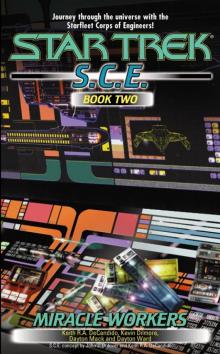 Miracle Workers
Miracle Workers Articles of the Federation
Articles of the Federation Supernatural Heart of the Dragon
Supernatural Heart of the Dragon War Stories: Book Two
War Stories: Book Two The Zoo Job
The Zoo Job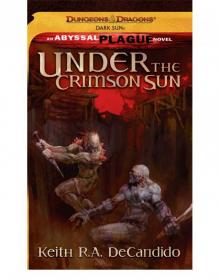 Under the Crimson Sun
Under the Crimson Sun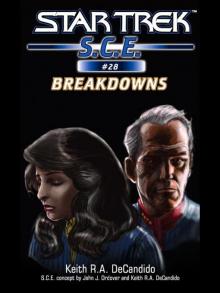 Breakdowns
Breakdowns Mermaid Precinct (ARC)
Mermaid Precinct (ARC) Supernatural 1 - Nevermore
Supernatural 1 - Nevermore STAR TREK - The Brave and the Bold Book One
STAR TREK - The Brave and the Bold Book One Four Walls
Four Walls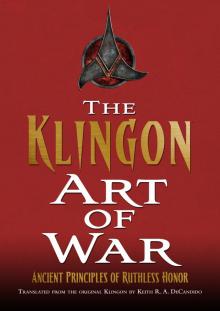 The Klingon Art of War
The Klingon Art of War Blackout
Blackout War Stories: Book One
War Stories: Book One The Brave and the Bold Book Two
The Brave and the Bold Book Two Honor Bound
Honor Bound Sleepy Hollow: Children of the Revolution
Sleepy Hollow: Children of the Revolution Worlds of Star Trek Deep Space Nine® Volume Three
Worlds of Star Trek Deep Space Nine® Volume Three Star Trek: TNG: Enterprises of Great Pitch and Moment
Star Trek: TNG: Enterprises of Great Pitch and Moment Genesis
Genesis Demons of Air and Darkness
Demons of Air and Darkness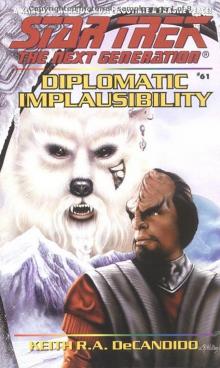 Star Trek - TNG - 61 - Diplomatic Implausibility
Star Trek - TNG - 61 - Diplomatic Implausibility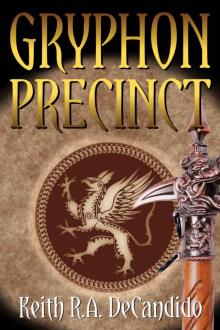 Gryphon Precinct (Dragon Precinct)
Gryphon Precinct (Dragon Precinct) THE XANDER YEARS, Vol. 1
THE XANDER YEARS, Vol. 1 Nevermore
Nevermore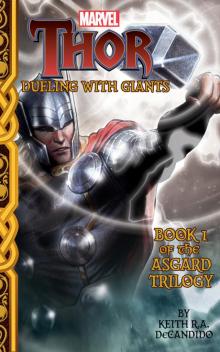 Thor
Thor The Brave And The Bold Book One
The Brave And The Bold Book One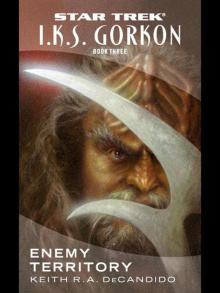 I.K.S. Gorkon Book Three
I.K.S. Gorkon Book Three STARGATE SG-1: Kali's Wrath (SG1-28)
STARGATE SG-1: Kali's Wrath (SG1-28) Bone Key
Bone Key Guilt in Innocece
Guilt in Innocece Star Trek - DS9 Relaunch 04 - Gateways - 4 of 7 - Demons Of Air And Darkness
Star Trek - DS9 Relaunch 04 - Gateways - 4 of 7 - Demons Of Air And Darkness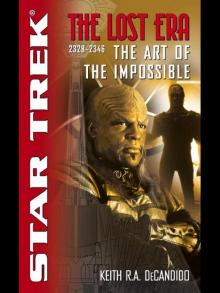 The Art of the Impossible
The Art of the Impossible I.K.S. Gorkon Book One: A Good Day to Die
I.K.S. Gorkon Book One: A Good Day to Die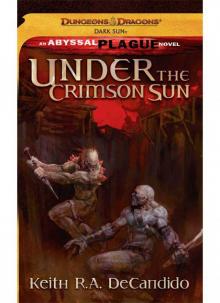 Under the Crimson Sun (the abyssal plague)
Under the Crimson Sun (the abyssal plague)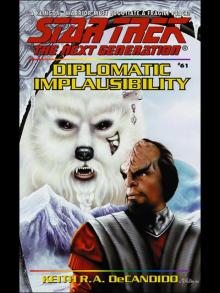 DIPLOMATIC IMPLAUSIBILITY
DIPLOMATIC IMPLAUSIBILITY Tales from the Captain's Table
Tales from the Captain's Table A Burning House
A Burning House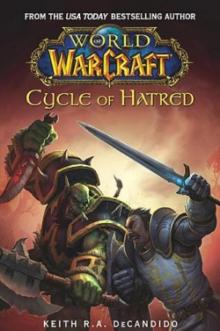 Cycle of Hatred (world of warcraft)
Cycle of Hatred (world of warcraft) Have Tech, Will Travel
Have Tech, Will Travel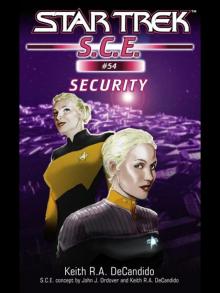 Security
Security